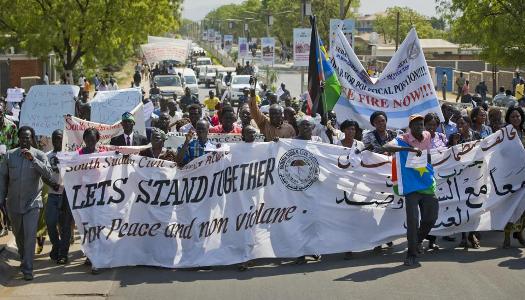South Sudan advocacy groups seek inclusion in forthcoming talks
January 30, 2014 (JUBA) – The leader of a coalition bringing together different civil society organisations in South Sudan said the group is seeking inclusion in upcoming negotiations between the government and the breakaway movement.

“The role of the civil society in the upcoming negotiations is critical, given that they represent an entire range of organised groups and institutions that are independent of the state, voluntary, and at least to some extent self-generating and self-reliant”, coalition leader Deng Athuai Mawiir said on Thursday.
The group includes representatives from NGOs, independent mass media, think tanks, universities, and local social and religious groups.
Mawiir said his group advocates for tolerance and the accommodation of pluralism and diversity, as well as supporting activities aimed at establishing ties between political parties and the state.
Preparations for the resumption of peace negotiations is expected to resume in coming days following the deployment of monitoring teams from neighbouring African nations.
South Sudan’s warring parties signed a peace deal in the Ethiopian capital on 23 January, although both sides have since been accused of violating the terms of the ceasefire agreement.
Upcoming discussions will be aimed at forming the Joint Technical Committee (JTC), which will be tasked with all military activities, specifically those relating to the verification and monitoring process of the truce.
STRONGER ENGAGEMENT
Mawiir observed that countries in transition like South Sudan face significant challenges, particularly when certain individuals or groups acting out of their own self or political interest attempt to monopolise the lives and ways of thinking of the population.
He warned that this approach was harmful and had no place in the building of a democratic society.
He stressed that the advocacy group was impartial and was not seeking to gain any political leverage against a particular side involved in the current crisis.
“I want to stress that our work as civil society is not in tension with the state. Because we are independent of the state and government doesn’t mean that it must always criticise and oppose the state. In fact our work is to work together with the government and other stakeholders in to ensure that at all levels there is accountability, [as well as an] effective, responsive and inclusive system and hence more legitimate administration”, he said.
He said the coalition worked to strengthen engagement between citizens and the state, as well as promote democratic ideals, with the view of developing a more effective and legitimate state administration.
Mawiir further argued that the participation of social activists would add more value to peace negotiations as they would be able tonot favour any group in a country full of angry and violence people, especially when the aggrieved party feels his right has been violated or deliberately being denied.
SUPPORT FOR INCLUSION
Luka Monoja Tombe, former minister of health and presently a member of parliament in the national legislative assembly, also appears supportive of the inclusion of civil society organisation in upcoming talks.
Other observers have expressed optimism that the participation of civil society organisations, which largely comprise of members of different ethnic groups, would help play an important role in diffusing simmering tribal tensions in South Sudan.
It remains unclear whether the president or the Intergovernmental Authority on Development (IGAD), a regional bloc currently mediating talks between the two sides would accept the inclusion of civil society organisations in the next round of discussions.
Meanwhile, South Sudan’s deputy foreign affairs minister, Peter Bashir Gbandi, said the government has already accepted dialogue as a matter of principle to resolve the conflict.
“The government has already expressed commitment and willingness to ending this conflict through peaceful dialogue. Anybody with healthy ideas, be it civil society organisations or other groups wanting to participate in the discussions to promote and harmony is welcomed”, Gbandi told Sudan Tribune in an exclusive interview on Thursday.
However, the official did not say whether the government would consider appointing members of civil society organisations to its negotiating team.
(ST)
